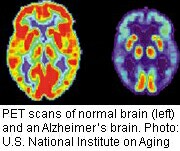High-dose oral resveratrol safe and well tolerated in Alzheimer’s disease patients
MONDAY, Sept. 14, 2015 (HealthDay News) — Resveratrol and its major metabolites penetrate the blood-brain barrier to have central nervous system effects in patients with Alzheimer’s disease (AD), according to a study published online Sept. 11 in Neurology.
R. Scott Turner, M.D., Ph.D., from Georgetown University in Washington, D.C., and colleagues randomized 119 patients with mild to moderate AD to receive either placebo or resveratrol 500 mg orally once daily (with dose escalation by 500-mg increments every 13 weeks, ending with 1,000 mg twice daily). Brain magnetic resonance imaging and cerebrospinal fluid (CSF) sample collection occurred at baseline and after completion of treatment (52 weeks). At baseline and throughout the trial (weeks 13, 26, 39, and 52), detailed pharmacokinetics were performed on a subset of 15 patients.
The researchers found that resveratrol and its major metabolites were measurable in plasma and CSF. In the placebo group, CSF Aβ40 and plasma Aβ40 levels had declined more significantly at week 52, compared to the resveratrol-treated group. Compared to placebo, brain volume loss was increased by resveratrol treatment. Nausea, diarrhea, and weight loss were the most common adverse events.
“Further studies are required to interpret the biomarker changes associated with resveratrol treatment,” the authors write.
Several authors disclosed financial ties to the pharmaceutical industry.
Copyright © 2015 HealthDay. All rights reserved.








